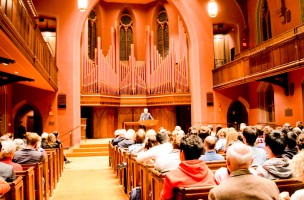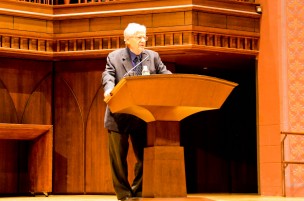On Tuesday, Oct. 8, Aharon Barak gave the 23rd annual Hugo L. Black Lecture on Freedom of Expression titled “Human Dignity and Free Speech.” Barak is a Professor of Law at the Interdisciplinary Center in Herzliya, Israel and he was formerly the President of the Israeli Supreme Court.
The Hugo L. Black lecture series alternates between fall and spring semesters. Each year’s lecture focuses on the First Amendment of the Constitution, specifically on freedom of speech.
“Students who attend one or more of [the Hugo L. Black lectures] during their time at Wesleyan benefit from hearing influential thinkers address topics in this area,” said Dean of the Social Sciences and Director of Global Initiatives Joyce Jacobsen.
University Communications Manager of Media and Public Relations Kate Carlisle also noted that the Hugo L. Black Lecture offers a unique perspective for the entire community to hear.
“One of the great things about these lectures is that they really bring the community together about a topic that is very important but [that] we do not think about all of the time,” Carlisle said. “We are used to freedom of speech and freedom of expression, but it is not often that we hear somebody talk about it in a different light.”
Barak served as a justice on the Israeli Supreme Court from 1978 to 1995 and as president from 1995 to 2006. He currently lectures at Yale University.
“Professor Barak is a very important jurist,” Jacobsen said. “We are fortunate that he also visits Yale Law School each fall to give a series of classes, and so we were able to have him come to us as well while he is over here from Israel and in residence in New Haven.”
Throughout the presentation, Barak discussed the First Amendment and its perception in different countries, concentrating on the definition of human dignity.
“Human dignity cannot be limited,” Barak said. “Human dignity means a free view of the human being. It means that every man or woman is an operational human being.”
He elaborated on this concept by drawing from personal experience with a particular legal case.
“We decided in a line of cases that dignity includes free speech—not every free speech—but the dignitary part of free speech is part of our dignity,” Barak said.
The event generated varied responses from the University community.
“It was really fascinating to hear about how the recently constitutional right to free speech was developed in Israel, especially because it is something so taken for granted in the United States,” said Mira Klein ’17. “It is easy to forget that something like free speech that is held as a core value in a society might not be explicitly reflected in its constitution, and how despite these values it is very difficult to put these values into law.”
Yet others disagreed with that for which Barak stands. Before and during the presentation, a number of students and community members held up banners and signs of protest outside of the Memorial Chapel.
Member of Wesleyan Students for Justice in Palestine (WesSJP) Justine Mitchell ’15 was one of the students involved in the protest, and she drafted a press release concerning the issue with other members of WesSJP and the greater community. The press release was published on Tuesday, Oct. 8.
“Inviting a senior Israeli judge to lecture us on freedom of expression will serve to further normalize the illegal Israeli occupation of Palestine,” Mitchell said, reading from the press release. “As President of the Israeli Supreme Court, Aharon Barak was complicit in a military occupation that, day after day, violates human rights and international law. Judge Barak did not hold Israel accountable for the injustices being committed, but we will.”
In this press release, Dan Fischer ’12 expressed his disapproval of the speaker.
“When my alma mater invites a top judge who legalized Israel’s separation wall and sanctioned torture, they make apartheid seem legitimate,” Fischer said. “Barak’s court disregarded international law, which says the occupation is illegal and Palestinians are constantly being denied basic freedoms of speech and movement.”
Barak was chosen to be this year’s speaker in an effort to increase the number of speakers who reside outside of the United States. Jacobsen expressed her belief that having a speaker from another country helps to present international viewpoints.
“It is interesting to hear about free speech issues in the framework of another country’s legal system,” Jacobsen said.
Klein expressed the same sentiment.
“It was a reminder that a country’s law develops independently,” she said. “Even the laws of any two democracies will not be exactly the same.”
-
dissident
-
Disgusted
-
alum

